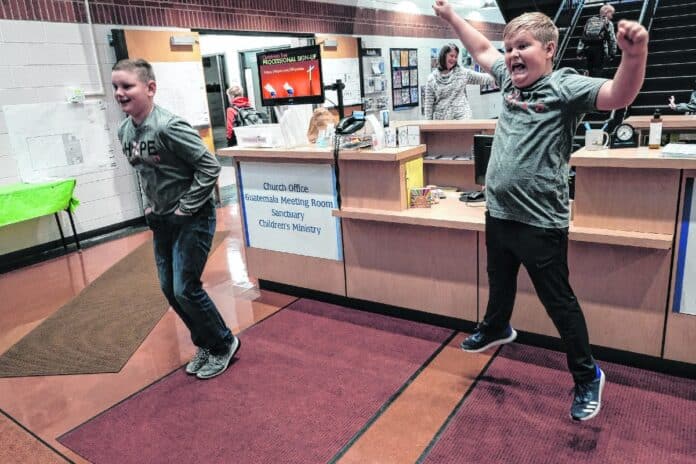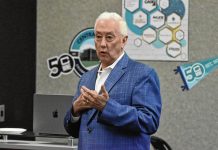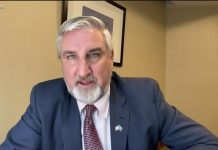
The numbers are alarming.
Bartholomew Consolidated School Corp. student assistance coordinator Larry Perkinson acknowledges that.
In 2019, an average of 35 percent of BCSC students in Grades 6-12 reported feeling sad or hopeless for two or more weeks in a row — a nearly 5% increase since 2017, according to the Indiana Youth Survey.
This year, about 17% of BCSC students in Grades 6-12 reported that they had considered suicide at least once. Just over 14% of students in Grades 6-12 said they made a plan about suicide once in their life.
[sc:text-divider text-divider-title=”Story continues below gallery” ]Click here to purchase photos from this gallery
Perkinson knows. School district leaders are aware. Teachers see it in their classrooms. Students notice it in their peers. But BCSC isn’t alone.
Suicide was the second leading cause of death among individuals between the ages of 10 and 34 in 2017, according to the Centers for Disease Control and Prevention. Suicide rates increased in nearly every state from 1999 through 2016. Data from the CDC found that nearly 47,000 people in the United States died because of suicide in 2016.
Perkinson said 2018-19 was the first school year since 2008 when BCSC did not have a youth suicide in its district.
“We have to stay focused on what we can do,” Perkinson said. “It is difficult to understand the inner struggle that so many youth and adults face, isn’t it? Yet schools and communities have chosen not to remain silent.”
Members of the Columbus community are stepping up to the plate to ensure no more lives are lost to suicide. Through peer mentoring, trauma-informed care, counseling programs and even a national initiative called Hope Squad, people of all ages across Columbus are starting the conversation.
Motivated to help
Jennifer Wright-Berryman knew a part of the issue was that communities don’t talk openly about suicide. Berryman, a former professor at IUPUC, started a public conversation in Columbus via social media and was motivated to do community-based work.
Her career focused on teen and youth suicide, and she started searching for programming that local schools could implement. That’s how she discovered Hope Squad, a suicide prevention program.
“Suicide rates, even though they’re increasing, what we don’t understand is that for every one suicide death, there are like 100 attempts,” Berryman said. “What we really want to be thinking about is suicide attempts — the numbers we don’t know.
Berryman said what’s not known is how many kids sustain personal injuries or mental health crisis.
“We look at suicide death rates as a measure, but that measure doesn’t really tell the story of what our youth are going through,” Berryman said. “We put Hope Squad in place so that we don’t have deaths, but what it does over time is it changes the schools so it reduces things like attempts and other suicide-related behaviors.”
The program, which originated in Utah after the death of a high school student in 1998, is now in more than 400 schools across the United States and Canada.
Bartholomew County is home to two Hope Squads, one at Ivy Tech Community College and another at St. Peter’s Lutheran School. The Junior Hope Squad at St. Peter’s is composed of 15 students in Grades 4-6 who were nominated by their peers, said Violet Dickerson, St. Peter’s Lutheran School counselor and Hope Squad coordinator.
Students help classmates
Members of the St. Peter’s squad meet every Tuesday morning during the school year to receive training about how to be a good listener, self care, good secrets versus bad secrets and how to identify someone who may want to harm themselves through body language and phrases.
“It’s very exciting to know students who possess good empathy and are caring and good listeners, that we could equip them to be good connectors. These students are already on the front lines,” Dickerson said. “They’re already getting approached by friends who say, ‘I’m just not happy. What if I never came to school anymore?’
Dickerson said students are feeling isolated and alone, and they tend to tell their peers before they tell any other adults. When a student approaches a Hope Squad member about their feelings, the Hope Squad member is trained to connect them with an adviser who could then talk to them and refer them to additional help.
Five students from each grade level 4 through 6 serve on the St. Peter’s Hope Squad and act as what Dickerson calls the “eyes and ears of the school.” When they see a student eating lunch alone or playing on the playground alone, squad members are encouraged to reach out to those students.
“This year we had more referrals to kids talking about suicide than any other year and I think that was because we have Hope Squad in place,” Dickerson said. “Not every referral was an immediate threat, but now they’re on our radar and we can check in with them.”
Ivy Tech’s Hope Squad is still functioning, but Ivy Tech spokesperson Chris Schilling said it is in a holding pattern as the college fills its vice chancellor of student success position, which oversees the Hope Squad.
BCSC does not have a Hope Squad in any of its 18 school buildings, but Perkinson said the corporation applauds the leadership and help that Hope Squad does bring to the county’s youth.
Peer mentoring is something Perkinson said BCSC has implemented in its high schools to help address the problems that students encounter.
“Developing peer mentors helps young people create the same kind of supports and positive, caring atmosphere that adults are striving to build as well,” Perkinson said. “The numbers indicate that we have to make an effort to connect with those around us. Having people who care and who provide support creates hope.”
Another outreach
The district-wide Counseling Counts initiative is another method that BCSC is using to ensure its students are receiving the care and treatment they need.
Doug Moore, a retired Columbus East counselor and implementer of the Counseling Counts grant, said the corporation applied for the $1.1 million grant from the Lilly Endowment to help students who are dealing with drug and alcohol abuse, suicidal thoughts, homelessness and other issues.
BCSC has used the funding to develop a two-tiered approach focused on prevention and providing resources to prekindergarten through 12th-grade students through a community-based system approach with health partners such as Centerstone, Family Services Inc. and Columbus Regional Health.
Moore said the district identified multiple goals it wants to achieve through Counseling Counts. A major goal was to place mental health workers in each of the district’s 18 school buildings, allowing school counselors to shift their focus from the social and emotional well being of students to the more traditional guidance-counselor support for students.
The district achieved that goal, and Moore said they hope to add more therapists to the schools throughout the remainder of the grant, which ends in 2021.
Through the two-tier system, BCSC has also created a universal recommendation form for students to be recommended to outside mental health providers, birthed a student support hotline designated for BCSC students and families and established an environment for the developmental assets framework.
“We’re a community that recognizes that there are developmental assets — that if we can connect with kids, if we can provide someone they’ll talk to, if they learn to trust teachers, if we can develop those assets that allow them to trust teachers, the neighborhood, the community,” Perkinson said. “School’s not just about school grounds. It’s about who in our community is going to respond to take care of us.”
Youth with more assets are more likely to do well in school, be civically engaged and value diversity. They are least likely to have problems with alcohol use, violence, illicit drug use and sexual activity, according to the Search Institute, a nonprofit organization that founded the developmental assets framework.
Beyond the Counseling Counts grant, the BCSC school board also approved a measure in April to transition the district’s three high schools from a traditional schedule to a block schedule beginning in the 2020-21 school year. A block schedule means students would alternate different classes between two days with longer class periods.
Columbus North principal David Clark stressed in a March 4 presentation that a block schedule is not only about getting more content into longer class periods, but is also about helping students through social and emotional learning opportunities.
More to do
But even with all the new changes that Bartholomew County schools have implemented over the last several years, Dickerson said there’s still work to be done.
“There’s a lot of shame and stigma around mental health illnesses and suicide,” Dickerson said. “It’s not talked about. If it’s not talked about, we don’t know how it’s affecting our school. Put it in the spotlight. If you’re struggling, we’re going to take care of you.”
Perkinson echoed Dickerson’s comments.
“Bartholomew County works together,” he said. “Agencies and schools share language, initiatives and concerns. The schools, the counseling community, law enforcement, court services, our health services, youth agencies — I can’t name all the groups involved, but I can tell you that I hope every other country does the same. No single entity can address the issues alone that our kids and families face.”
[sc:pullout-title pullout-title=”What is Hope Squad?” ][sc:pullout-text-begin]
Hope Squad is a school-based peer support program that empowers selected students to take action to improve the school environment. Hope Squad members are trained to recognize if they or their peers are at risk for suicide as well as how to encourage peers to seek help from a trusted adult.
Source: Hope Squad
[sc:pullout-text-end][sc:pullout-title pullout-title=”National Suicide Prevention Lifeline” ][sc:pullout-text-begin]
National Suicide Prevention Lifeline: 1-800-273-8255
If you’re thinking about suicide, are worried about a friend or loved one or would like emotional support, the National Suicide Prevention Lifeline network is available 24/7 across the United States.
[sc:pullout-text-end][sc:pullout-title pullout-title=”About Counseling Counts” ][sc:pullout-text-begin]
To learn more about Bartholomew Consolidated School Corp.’s Counseling Counts grant, visit bcsc.k12.in.us/domain/3182.
[sc:pullout-text-end]




